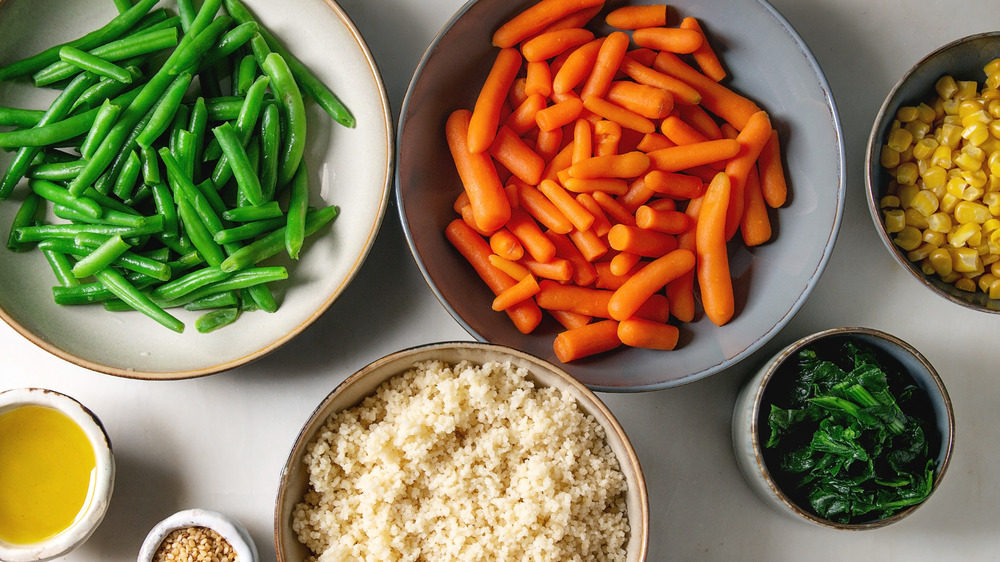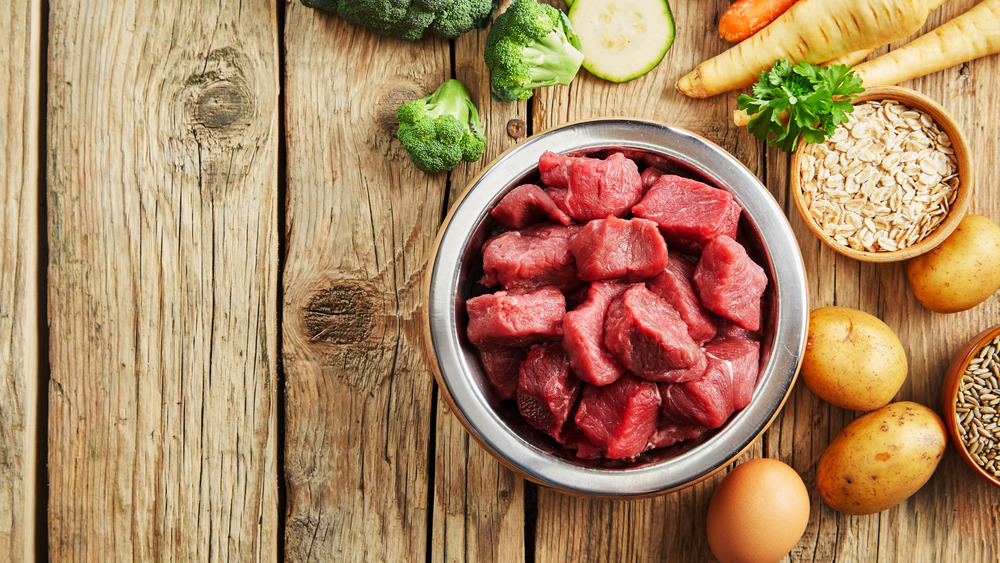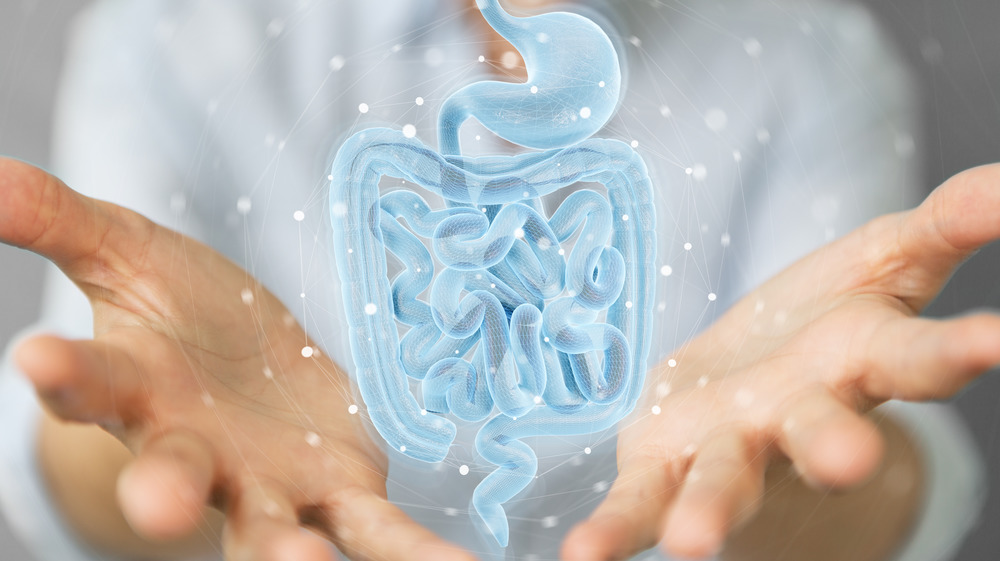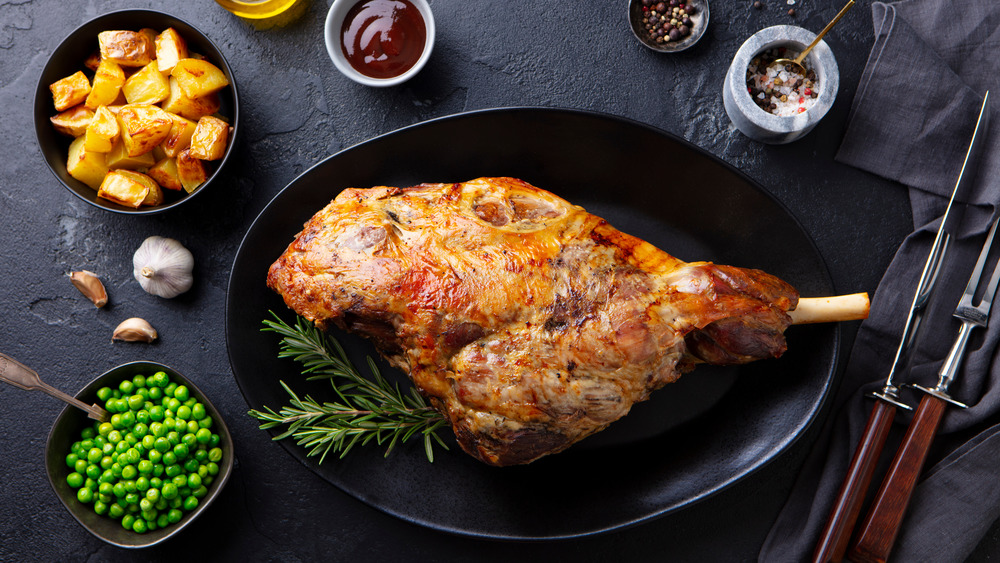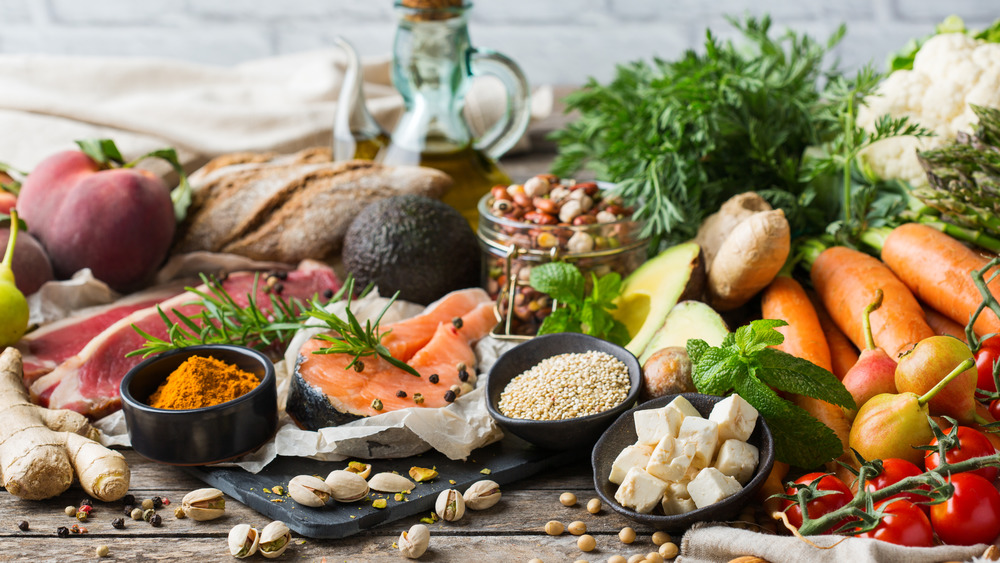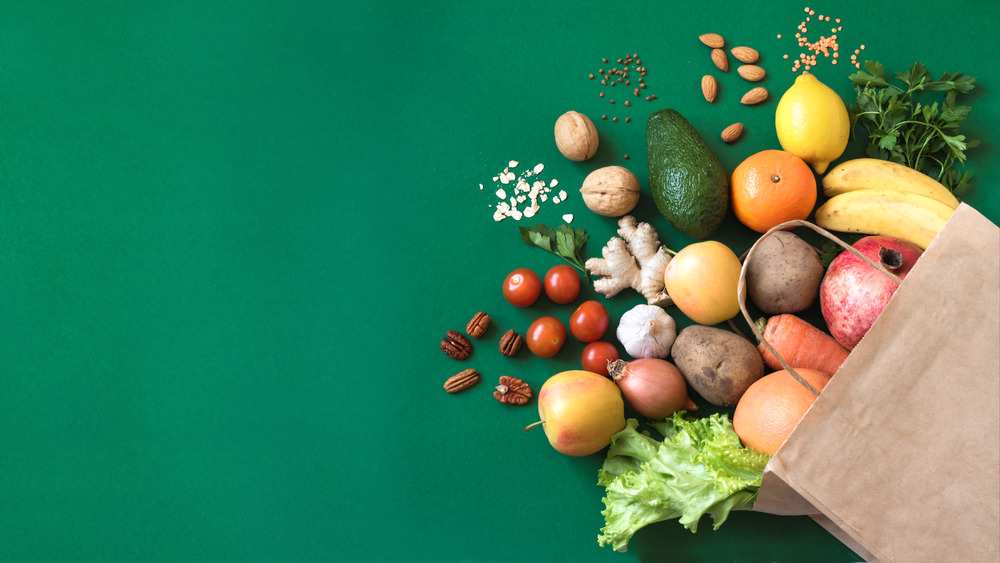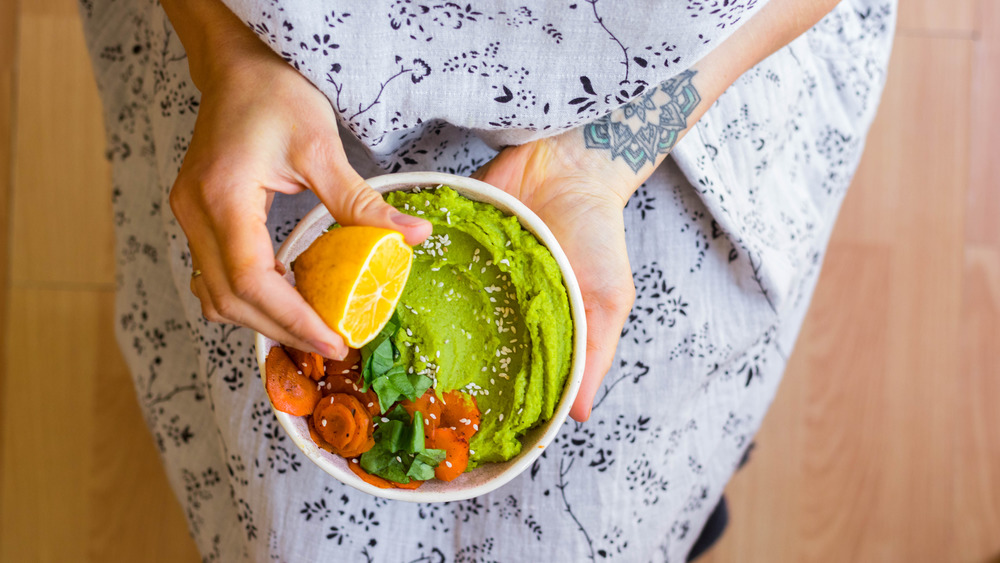The Truth About Food Combining
The theory of food combining goes back a long way. It has its roots in Aryuveda, an ancient Hindu wellness system that encourages people to eat according to their individual energy type, called a dosha (via Verywell Health). The Aryuvedic diet incorporates some principles of food combining — that is, not eating certain foods at the same time — as does the macrobiotic diet.
However, "food combining" as we know it today wasn't really established until 1920, when physician William Howard Hay categorized foods into three groups: acidic (protein-rich foods), alkaline foods (starchy carbohydrates), and neutral foods (presumably fruits and vegetables). According to Hay, acidic and alkaline foods were never to be eaten at the same time. Hay believed that keeping these foods separate would help the stomach and digestive system maintain the proper pH balance, improve overall health, and lead to weight loss (via Verywell Health).
Of course, Hay wasn't basing this on any concrete evidence, because at the time there wasn't any. Before you decide to give food combining a go, read what experts and the evidence have to say about it.
Food combining devotees believe eating the wrong foods together impairs digestion
Food combining advocates generally only eat one type of food at a time, which isn't exactly the way most of us are used to eating. "The idea behind 'food combining' diets is that different foods digest at different rates in the body and require different digestive environments. And, therefore, that foods need to be eaten in groups and at specific times that compliment these factors," dietitian and sports nutritionist Robbie Clark told HuffPost Australia.
The idea behind food combining is that our bodies use different enzymes to digest different types of food, and that eating multiple food groups at the same time will cause digestive issues like gas, bloating, pain, and indigestion, the publication explained.
According to the principles of food combining, eating several different types of food at the same time will leave you with partially digested food in your system, since one type of food will just sit there in your gut while another type finishes digesting, Clark continued in his interview with HuffPost. This assumes that your stomach can't multitask and digest all different types of food at once. However, there's little to no science to back up this thinking, according to Clark.
When food combining, you don't eat protein and starch in the same meal
If you're following the principles of food combining, you can't eat traditional meals like meat and potatoes, turkey sandwiches, hamburgers, or spaghetti and meatballs. Why? Because the principles of food combining forbid eating protein and starches together, with the thinking that different enzymes digest carbs and protein and are broken down at different times. (via HuffPost Australia).
If you think about it for a minute, you'll realize that this is a very unconventional way of eating. Most meals combine carbs and protein, because the combination is filling, balanced, and nutritious. Plus, do you really want to snack on a plate of plain pasta and then eat just plain meatballs for dinner? Or eat a burger bun and then wait an hour to chow down on the actual burger? Likely not.
Experts also advocate for combining protein and carbs. In fact, the 2020-2025 Dietary Guidelines for Americans recommend eating balanced meals that contain protein, carbs, healthy fats, and high-fiber fruits and vegetables.
When food combining, you can only eat fruit on an empty stomach
A key tenant to food combining is that you can only eat fruit on its own, and on an empty stomach. That means no eating fruit with meals or after meals. Food combining advocates believe that only eating fruit on an empty stomach will allow for efficient digestion, nutritionist and celebrity chef Zoe Bingley-Pullin told HuffPost Australia.
Although there's no science to back this up, the principles of food combining claim that fruit will rot in the gut if eaten alongside other foods or on a full stomach, causing bloating, gas, diarrhea, pain, and discomfort. So, you can forget pork-and-apple dinners, or even using avocado or guacamole as a garnish (since it's technically a fruit).
Food combiners are also forbidden from eating fruits and vegetables together. "The theory here is that fruits and vegetables have different biochemical structures and therefore breakdown at different stages of digestion," dietitian and sports nutritionist Robbie Clark told HuffPost Australia. That means no snacking on a combination of apples and carrot sticks.
Food combining is a simplistic (and problematic) way to look at food
Because of all of its rules, the food combining diet is incredibly restrictive and hard to follow. For starters, it eliminates tried-and-true staple combinations, like sandwiches, meaty pastas, meat-and-potato stews, fish and chips, and pretty much any other traditional dish you can imagine.
"The food combining diet, in sum, is a fad diet," wrote registered Courtney Schupp in an article for Food Insight. It's also made up of "strict rules," according to Schupp, "and the research supporting its health benefits are limited at best. Instead, it's best to eat a balanced combination of nutrient-rich foods at every meal."
Since there's no real science to back all the restrictive principles of food combining, and so much evidence showing that it's better to eat a balanced, varied diet, you can see why experts aren't thrilled with this style of eating. And, really, knowing this, it's hard to imagine why anyone would choose to eat in a way that's overly restrictive, difficult, and not proven to offer any health benefits.
Food combining proponents believe that some foods eaten together will cause a backup of sorts
The basis behind food combining is the belief that "improper" combinations of food will wreak havoc digestive system. First, there's the thinking that foods digest at different speeds. Food combining advocates believe that eating "fast-digesting food" with "slow-digesting food" will lead to a "traffic jam" of sorts in your digestive system, thus ruining a person's digestion and making them feel bloated, gassy, sluggish, or even in pain, according to Healthline.
Then there's the belief that different foods, such as starches and proteins, require different pH balances (acidity or alkalinity) in the stomach for proper digestion. Following this train of thought, it would mean that because different foods must be broken down at different pHs in the stomach, it is physically impossible for two different types of food to be broken down at the same time (via Healthline). However, Healthline explained, "There's no need to worry that your body will have to choose between digesting protein and fat or starches and proteins." It can handle such combinations.
Only one human study has assessed food combining, and the results were unconvincing
As of this writing, only one study has been conducted specifically on food combining — and it showed that the approach had no benefits. In the study, published in 2000 in the International Journal of Obesity, researchers split 54 participants, all obese adults, into two groups to receive either a low-calorie "balanced" diet, or a low-calorie "dissociated" (food combining) diet. They found that over six weeks' time, both groups lost weight and experienced improved blood sugar, cholesterol, and blood sugar levels. This was to be expected as the diets were low in calories and the study was short.
That said, the food combining group had the same results as the balanced diet group, suggesting that any benefits came from the fact that all participants were eating nutrient-dense, low-calorie diets. Essentially, the food combining part had nothing to do with it.
Of course, this was a very small study. However, researchers may not have much of a need to study food combining as the principles behind it don't hold up to basic science. "Many of the original food-combining diets were developed more than 100 years ago, when much less was known about human nutrition and digestion," Healthline explained. "But what is now known about basic biochemistry and nutritional science directly contradicts most of the principles of food combining."
Food combining contradicts what science says about digestion
Although food combining may sound reasonable on the surface — pair like foods together and separate unlike foods — it's important to know how your digestive system actually works in order to debunk this diet. You see, proponents of food combining believe that carbs and proteins are digested at different rates and can't be properly handled in the stomach when eaten together (via Healthline). However, this is totally bogus. Our digestive systems are meant to handle several different types of food at once.
The two enzymes used to break down protein and fat, pepsin and lipase, are released as soon as food enters the stomach — no matter what type of food it is, according to a review published in Current Opinions in Gastroenterology. And dietitian Courtney Schupp explained in an article for Food Insight that other enzymes in our saliva actually "kickstart" the process of breaking down carbs, which are then primarily digested in the stomach. Proteins are only partially broken down in the stomach and then pass to the small intestine where the rest of their digestion occurs, along with the digestion of fat. So, it doesn't actually matter if you eat these foods together, considering they all go to different places in the digestive system to get digested anyway.
Food combining could lead to blood sugar spikes
Experts warn against following the food combining diet not only because it is lacking in evidence, but because it's restrictive (via Food Insight). Plus, there can actually be consequences to separating different foods and never eating them at the same time. For example, only eating starches by themselves or only eating fruit on an empty stomach could lead to blood sugar spikes.
"The food combining diet forbids eating carbohydrates with protein and requires fruit be eaten alone," registered dietitian Willow Jarosh told Verywell Fit. "Many health experts suggest eating protein with carbohydrates to stabilize blood sugar and provide satiation." Protein and fat help to slow the digestion of carbohydrates, so that we get steady levels of glucose released into our bloodstream slowly, as opposed to all of that glucose (from the carbs we eat) getting dumped in at once.
It's fine to have a high-carb, low-protein meal or snack every once in a while, but always separating carbs and protein means that your blood sugar levels could be constantly spiking and dipping, leading to an increased risk of diabetes (via Healthline).
Food combining is not sustainable
Imagine if dinner every night was a plain plate of steak? Picture having to go back to the kitchen an hour later for a serving of plain brown rice? And forget eating a piece of fruit or a sweet treat as a late-night snack because added sugar is forbidden and fruit can only be eaten on an empty stomach (via HuffPost Australia). That's what life looks like on the food combining diet.
In short, diets like the food combining diet with so many intricate rules that don't fit with the way we normally eat are totally unsustainable. Even if you're able to stick to food combining for a few days, it's highly unlikely that you'll be able to stick to it long term. You'll go out to dinner with friends and won't be able to find a meat-only or starch-only dish on the menu. Or maybe you'll be in a work meeting and be served a chicken salad with grapes. Once you return to your usual eating habits, you'll gain back any weight you may have lost on the food combining diet — possibly even more (via Verywell Fit).
Food combining emphasizes whole foods, which is a good thing
The food combining diet isn't all bad as it does encourage people to eat more whole foods. However, you could say this part of the diet falls under the umbrella of "right idea, wrong execution." Food combining forbids or strictly limits processed foods like refined grains and sugars. Of course, there's evidence to support that eating mostly whole foods is a nutritious approach.
According to a 2019 article published in Nutrients, getting people to eat fewer processed foods and more whole foods would greatly improve health around the world. The thing is: Most experts don't say that people must eat only whole foods and eliminate processed ones altogether. Instead, the 2020-2025 Dietary Guidelines for Americans recommends getting no more than 10 percent of your calories from added sugar, no more than 10 percent of your calories from saturated fat, and no more than half your grains from refined grains.
That's very different advice than cutting these things out altogether. Experts promote these more lenient guidelines because they understand they're a more realistic and sustainable approach for the vast majority of people compared to cutting out processed foods altogether.
The foods you eat do not alter the pH of your digestive tract
Your digestive system has all the necessary enzymes and procedures in place to break down several different types of food at once. It also has a tightly controlled pH that isn't affected by which foods you choose to eat or not eat.
Although some people believe that eating acidic foods like protein makes your digestive system more acidic and eating alkaline foods like starch makes them more alkaline, this just isn't true. In reality, your stomach is almost always extremely acidic, with a pH of 1 to 3.5 (via Medline Plus). The pH can go up after you eat, because all foods are more alkaline than this, but it quickly goes back down when your stomach fills with gastric acid that helps with digestion.
Your small intestine can't handle such acidic contents, so natural regulatory systems in your body add bicarbonate (a very alkaline compound) to the mix of food and acid in your stomach before it hits your small intestine (via Concepts of Biology). This is a natural bodily process that occurs whether or not you subscribe to the food combining method.
Fermentation in your gut is actually a good thing
The reason that food combining principles say only to eat fruit on an empty stomach is to prevent fermentation in your gut. Okay, fermentation in your gut might sound strange — especially if you've ever made kimchee or yogurt and understand how it works. However, some fermentation of certain compounds inside your digestive system is actually a good thing. You may have heard of probiotics and a healthy gut microbiome. It's fermentation that makes these things possible.
In fact, a 2013 review published in Current Opinions on Microbiology explained that healthy bacteria (probiotics) in your large intestine feed on undigested probiotic fibers found in fruits and vegetables and subsequently release gas and health-promoting short-chain fatty acids as waste. The fatty acids released can reduce inflammation and improve blood sugar control, and the probiotics themselves (kept alive by probiotic fibers) help improve digestion and overall health.
Of course, this happens whether you eat fruit on its own, as food combining suggests, or as part of a balanced meal or snack. However, there's no reason to go out of your way to eat fruit on its own or on an empty stomach (via U.S. News & World Report).
There are some foods that you should be combining
"Food combining" is kind of a misnomer. Really, the principles of food combining are all about which foods you shouldn't combine. But instead of trying to keep your foods separate, you should know there's evidence that shows eating certain foods together could have health benefits.
For one thing, eating citrus fruits with plant-based foods that contain iron — spinach, rice, beans, et cetera — can actually increase how much of that plant-based iron your body absorbs. This is because the vitamin C in citrus fruits makes that iron more absorbable, and it combats other compounds that might make it less absorbable, a 2014 review in Nutrients explained.
It's also a good idea to eat red, orange, and dark green vegetables — which contain fat-soluble vitamins A, D, E, and K — with a source of healthy fat, like olive oil, avocado, or nut butter (via Health). Your body can only absorb these important vitamins when fat is present, so it's important to eat the two things together, a report in the American Journal of Clinical Nutrition revealed. Instead of trying the food combining diet, you may want to think about quite literally combining foods.

